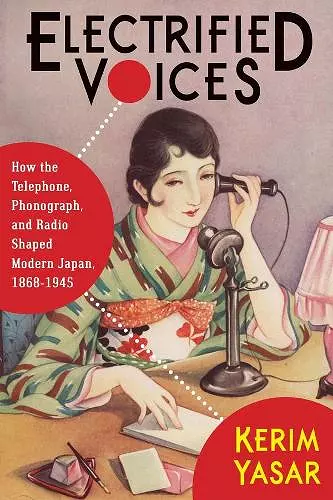Electrified Voices
How the Telephone, Phonograph, and Radio Shaped Modern Japan, 1868–1945
Format:Paperback
Publisher:Columbia University Press
Published:9th Nov '18
Currently unavailable, and unfortunately no date known when it will be back

Long before karaoke’s ubiquity and the rise of global brands such as Sony, Japan was a place where new audio technologies found eager users and contributed to new cultural forms. In Electrified Voices, Kerim Yasar traces the origins of the modern soundscape, showing how the revolutionary nature of sound technology and the rise of a new auditory culture played an essential role in the formation of Japanese modernity.
A far-reaching cultural history of the telegraph, telephone, phonograph, radio, and early sound film in Japan, Electrified Voices shows how these technologies reshaped the production of culture. Audio technologies upended the status of the written word as the only source of prestige while revivifying traditional forms of orality. The ability to reproduce and transmit sound, freeing it from the constraints of time and space, had profound consequences on late nineteenth-century language reform; twentieth-century literary, musical, and cinematic practices; the rise of militarism and nationalism in the 1920s and 30s; and the transition to the postwar period inaugurated by Emperor Hirohito’s declaration of unconditional surrender to Allied forces—a declaration that was recorded on a gramophone record and broadcast throughout the defeated Japanese empire. The first cultural history in English of auditory technologies in modern Japan, Electrified Voices enriches our understanding of Japanese modernity and offers a major contribution to sound studies and global media history.
A delightful and insightful narrative that weaves vivid human examples into a theoretical discussion of the meanings of media and sound. * Pacific Affairs *
With Electrified Voices, Kerim Yasar provides a brilliant and stimulating analysis of the role of sound media (telephone, phonograph, radio, and early sound films) in the transition of Japan to modernity. -- ANDRE LANGE * Historical Journal of Film, Radio, and Television *
Electrified Voices is a well-researched book, which looks at the early days of Japan’s telecommunications, recording, radio and film industry. -- David Harris * Radio Enthusiast *
This is an ambitious and wide-ranging study of Japan’s modern auditory culture at a time of great changes. The book lends itself well to use in the classroom and will be helpful to historians who wish to provide a different perspective not only on Japanese history but also on the history of technology. * American Historical Review *
Insightful and informative, Electrified Voices opens up important new paths for thinking about cultural, social, and political praxes in modern Japan. . . . The voices that Yasar reveals help us, in short, to hear history anew. -- Scott W. Aalgaard, Wesleyan University * Monumenta Nipponica *
Electrified Voices represents a valuable and highly accessible contribution to the global history of technology and sound as well as to our understanding of the cultural history of modern Japan, and it deserves a wide readership. -- Margaret Mehl, University of Copenhagen * Journal of Japanese Studies *
Electrified Voices is an innovative, pathbreaking study of sound culture, media, and technology in modern Japan. -- Seiji Lippit, University of California, Los Angeles
The sounds coming from Japan in this book are both strange and familiar to ears used to reading about acoustic modernity in the North Atlantic world. Kerim Yasar has found new stories and characters for asking classic questions in media history and I, for one, am delighted to be enriched by a media-historical book on Japan that is so innovative in its historical approach and its choice of media. This book sings the body electric in Japan. -- John Durham Peters, Yale University
Kerim Yasar recounts the fascinating story of how modernity in Japan sounded. Eminently readable, his book traces how Japan’s existing soundscape found itself translated and transformed by such modern audio technologies as the telephone, gramophone, radio, and talkie cinema, and how the process launched new debates about what it means to represent the real. -- Michael K. Bourdaghs, author of Sayonara Amerika, Sayonara Nippon: A Geopolitical Prehistory of J-Pop
ISBN: 9780231187138
Dimensions: unknown
Weight: unknown
304 pages